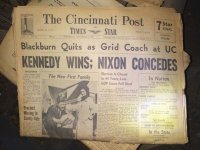Teaching News Writing to Teach History Writing
When I was a student, nothing helped me become more skilled at writing history than learning about journalism -- news reporting, in particular. I don't mean to undervalue my fabulous teachers in high school or college, many of whom spurred my intellectual growth and curiosity. Still, learning about reporting played a pivotal role in my success as a history major at one of America's most revered academic institutions, Brandeis University in Waltham, Massachusetts. Each year, then, I teach my high school history students some news-reporting basics. You might consider doing the same.
Teaching About Concision and Clarity
The best student history essays are concise and clear. Read any front-page New York Times article, and you'll notice concise, punchy prose that gets straight to the point. Take Wednesday's terrific business story by reporter Binyamin Appelbaum, "Citing Growth, Fed Again Cuts Monthly Bond Purchases.”
The "lede graf" (journalism slang for "opening paragraph") is chock full of juicy information. Better still, Appelbaum avoids needless words, especially long or obscure ones. We know what Appelbaum is reporting on, and what he will examine closely.
Last week, my sophomores put their European history books aside to study news writing. Most of them came away with a better understanding of how and why they should write more like Appelbaum -- more concisely and clearly.
To assess their learning, I assigned a fake news lead. "The search for Savannah Mash, 17, continues after authorities uncovered evidence of the teen's possessions in the bushes of a Garden City, Miami residence," one student wrote. After sharing her work in class, she told me me how this activity "helped make learning to write easier and more enjoyable."
Teaching About Fairness and Objectivity
Quality historical writing also requires dispassionate, objective analysis. For many students (and experts), this is difficult to achieve -- all the more so when dealing with tragic events. Even as a graduate student in history, I found it difficult to remain neutral when writing my master's thesis, The Historian's Craft: Comparative Uses of Genocide Survival Accounts.
I certainly don't mean to argue that we should teach high school history students to write without emotion, or silence anybody's unique voice. But we must teach students to balance objectivity and compassion -- and, once again, great news writing serves as a terrific example.
Next week, I plan to have my students read an April 14, 1994 New York Times article by Donatella Lorch, "Anarchy Rules Rwanda's Capital and Drunken Soldiers Roam City." The lede and "nut graf" (journalism slang for "second paragraph," usually of a feature news story, that provides additional and necessary context) strike that balance. Lorch crafts a respectful and responsible narrative of the early days of a genocide which would claim upward of one million lives.
At the end of the year, I want my students to leave my classroom better able to write like Lorch, whose storytelling approach captures the reader's heart and mind. For an upcoming writing assignment, in fact, I'm having my students rely on Lorch's piece as a launching pad to cover a topic of their choosing -- so long as it has something to do with European history, with sufficient primary source material to inform their analysis.
Teaching About Sources and Fairness
History teachers often tell students to make effective use of sources, and -- surprise, surprise -- news articles reinforce that point. Furthermore, the best stories quote sparingly and briefly, another lesson history students would do well to learn.
Few things are more upsetting to a history teacher than to have to ask a student, "How about some analysis with those quotes?" In a news story, when a source is quoted, it's necessary to provide balance and unique insight. Accordingly, I might ask a student, "Can you write a summary that does justice to this quote in Lorch's story?"
Have you also found educational uses for news writing in your history classes?
